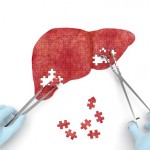Alcoholic liver disease and vitamin A link found
 New research has uncovered a link between alcoholic liver disease and vitamin A. To reach the new findings researchers conducted numerous experiments on different groups of mice, some received food with alcohol, and some food without alcohol. Researchers examined enzymes in the liver and other organs like the kidneys, heart and lungs from the mice and measured their levels of vitamin A.
New research has uncovered a link between alcoholic liver disease and vitamin A. To reach the new findings researchers conducted numerous experiments on different groups of mice, some received food with alcohol, and some food without alcohol. Researchers examined enzymes in the liver and other organs like the kidneys, heart and lungs from the mice and measured their levels of vitamin A.
What researchers found was the mice that were fed food which contained alcohol handle vitamin A differently. Low vitamin A levels were seen in the liver but they were higher in other tissues of the body. The findings then reveal that vitamin A is strongly linked with alcoholic liver disease and researchers suggest this link is important to the development of alcoholic liver disease.
Alcoholic liver disease facts
 The name really describes it all – alcoholic liver disease is a disease which affects the liver due to alcohol consumption. It is caused by excessive, long-term drinking. Alcohol in high amounts causes the liver to become inflamed which leads to scarring of the liver. This, in turn, can result in cirrhosis which is the final stage of alcoholic liver disease. Although alcoholic liver disease does not necessarily occur in all chronic alcohol drinkers, the risk of development does increase the longer a person consumes alcohol and the more they consume.
The name really describes it all – alcoholic liver disease is a disease which affects the liver due to alcohol consumption. It is caused by excessive, long-term drinking. Alcohol in high amounts causes the liver to become inflamed which leads to scarring of the liver. This, in turn, can result in cirrhosis which is the final stage of alcoholic liver disease. Although alcoholic liver disease does not necessarily occur in all chronic alcohol drinkers, the risk of development does increase the longer a person consumes alcohol and the more they consume.
Depending on the stage of the alcohol liver disease symptoms can include:
- Pain and swelling in the abdomen region
- Decrease in appetite and weight loss
- Nausea and vomiting
- Fatigue
- Dry mouth and increased thirst
- Jaundice
- Itching
- Redness on feet or hands
- Problems with thinking, memory, concentration
- Numbness of legs or feet
Alcoholic liver disease prevention
 Even if you don’t consume alcohol to the point of getting drunk, if you partake in chronic alcohol consumption you are setting up your liver for disease. If you want to protect your liver and prevent alcoholic liver disease, then here are some effective tips:
Even if you don’t consume alcohol to the point of getting drunk, if you partake in chronic alcohol consumption you are setting up your liver for disease. If you want to protect your liver and prevent alcoholic liver disease, then here are some effective tips:
- Drink in moderation – Healthy adults should only consume one drink a day or two drinks if you’re a male under the age of 65. Even though these amounts are recommended, you should still avoid alcohol on a daily basis.
- Read medication labels – Find out if they suggest any interactions with alcohol. Alcoholic liver disease can greatly worsen if alcohol is consumed with medications.
- Get the hepatitis shot – Hepatitis C in particular can lead to cirrhosis, if you have the virus and drink you put yourself at higher risk to develop cirrhosis. Ensure you have received your vaccines against hepatitis.
- When drinking socially don’t attempt to “keep up” with the group – Everyone has a different level for alcohol, so know your limit and stay within it. Additionally, it is best to alternate an alcoholic beverage with water. Not only will this prevent becoming drunk, but it reduces the amount of alcohol your liver has to break down.
- One form of alcohol isn’t “safer” for your liver than another – You may think a small glass of wine is better than a bottle of beer, but all forms of alcohol take a toll on your liver and body.
Even if you don’t wish to give up alcohol entirely, drinking smart can still protect your liver from developing alcoholic liver disease.
Side effects of excessive alcohol consumption
Alcoholic liver disease isn’t the only side effect of chronic alcohol consumption. Even in the short-term excessive alcohol consumption can have some serious side effects on the body as a whole, some of which include:
- Brain: Alcohol can affect the way the brain looks and how it works. Mood and behavior can be altered with excessive alcohol consumption.
- Heart: Alcohol can affect the heart by causing arrhythmias (irregular heart beat), cardiomyopathy (stretching and dropping of the heart). It can also contribute to stroke and raise blood pressure.
- Liver: Alcohol effects on the liver include alcoholic liver disease, fatty liver disease, fibrosis and cirrhosis.
- Pancreas: Alcohol effects on the pancreas cause the pancreas to produce toxins which can result in pancreatitis.
- Cancer: Chronic alcohol consumption has been linked with mouth, esophagus, throat, liver and breast cancer.
- Immune system: Alcohol can affect the immune system by weakening it which makes the body more prone to illness and disease. Chronic alcohol drinkers are more prone to pneumonia and tuberculosis. Additionally, a single occasion of drinking can impair the immune system for up to 24 hours.
Adverse effects of vitamin A levels
Vitamin A is commonly found in many fruits and vegetables. In women vitamin A can be used to treat heavy menstrual cycles, premenstrual syndrome, vaginal infections and yeast infections. In males vitamin A is used to maintain a healthy sperm count. Vitamin A has also been used in the treatment of eye disorders, skin rashes like eczema and in gastrointestinal disorders like Crohn’s disease.
When vitamin A is consumed in a healthy diet it is safe and helps the body, but excessive amounts of vitamin A can lead to adverse effects which include:
- Bleeding in the lungs
- Blurry vision
- Bone pain
- Breathing difficulty
- Changes in immune function
- Chronic inflammation of the liver
- Cirrhosis
- Cough
- Cracked fingernails
- Cracked lips
- Decreased thyroid function
- Depression
- Diarrhea
- Fever
- Fluid around the heart
- Feelings of fullness
- Hair loss
- High cholesterol
- Indigestion
- Muscle pain
- Mouth ulcers
- Skin irritation
- Sore eyes
- Respiratory infection
High dosages of vitamin A in a short amount of time can lead to toxicity – although rare. Individuals with liver disease are at higher risk of toxicity due to vitamin A.
If you’re concerned about your vitamin A levels, it’s best you speak with a doctor prior to taking supplements or herbs which may contain vitamin A in high amounts.
Liver cirrhosis: Causes, symptoms and prevention
When we discuss liver diseases many of us immediately think of alcohol or drug use. In reality there are actually over 100 different types of liver disease which can impact the function of the liver. Continue reading…
-
Excess Weight Is It Going To Kill You
For many years, the experts, including our government have been tellin
-
Weight Loss Truths Calorie Restriction Is The Key To Weight Loss Success
All successful weight loss programs rely on one common denominator; ca
-
3 Reasons To Not Use The Hoodia Diet Patch
You might disagree, but hear me out on this....The so called hoodia di
-
Extra Pounds Won’t Go Away? Try These Weight Loss Tips!
Getting in shape is hard to do. Follow the advice presented here
-
10 Habits of People Who Love to Work Out
V
-
Easy 3-Step Weight Loss!
What are the 3 most important steps you
- DON'T MISS
- Weight Loss Tips that Really Work
- The First Tragedy In A Lifetime Of Weightloss
- Weight Loss and Wealth
- Can Fat Reduction Treatment Help Kick Start Your Fitness Routine?
- One Of The Best Ways To Lose Weight Is To Eat Food With Low Calories
- Quick Weight Loss Diets - Dont Go Overboard
- Hypnosis To Lose Weight
- 12 Habits Of People Who Reach (And Maintain) Their Goal Weight
- How to Win at Losing Weight
- Top 10 Secrets to Lose Weight




